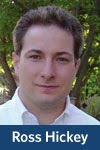By Maeve Luthin, JD, Professional Development Manager
Welcome to another installment of our featured PRIM&R member interviews where we introduce you to our members—individuals who work to advance ethical research on a daily basis. Over the course of the past few months we have been shining a spotlight on members of the Certified IRB Professional (CIP®) and Certified Professional IACUC Administration (CPIA®) Councils. Please read on to learn more about their professional experiences and what goes on behind-the-scenes in their lives!
Today we’d like to introduce you to Ross Hickey, assistant provost for Research Integrity at University of Southern Maine.
Maeve Luthin (ML): When and why did you join the field?
Ross Hickey (RH): My interest was first kindled during a biotechnology law class. As part of a class assignment, a classmate and I held a mock historical debate between C.S. Lewis and Friedrich Nietzsche on the ethics of genetic therapy and genetic engineering. We tried to base our arguments on what we guessed both men would think about the “new” technology and even tried to dress the parts, tweed jacket and all! Years later this classmate recruited me for my first job in research compliance.
ML: How did you learn about the CIP® credential?
RH: The same law school colleague who recruited me is a CIP. Studying for the exam gave him a comprehensive understanding of the subject matter—and that impressed me, so I, too, earned the credential.
ML: How has the credential advanced your career?
RH: The CIP® credential gives me a valuable benchmark for comparing my understanding to the current landscape of the field of human subject research.
ML: What skills are particularly helpful in a job like yours?
RH: Listening to others is a basic and critical skill. Additionally, it is helpful to understand, as best as possible, the motivation of the people with whom you are working. Helping them to be successful in their goals is perfectly fine, as long as it does not violate the rights of others in the process. Finally, the legal reasoning skill that law school instills is valuable when working through problems.
ML: What advice have you found most helpful in your career?
RH: A couple pieces of advice come to mind. First, I remember Jeff Cohen mentioning to smile (even when on the phone) when interacting with others. Dale Carnegie gives similar advice about the importance of smiling while building a relationship with colleagues. Another piece of advice for researchers, especially new student researchers, goes back to the “Golden Rule.” Treat the research subjects the way you would want to be treated if you were actually a subject in the study.
ML: What is something you know now that you wish someone had told you when you first entered the field? Or, what is an example of a lesson you had to learn the hard way?
RH: Before I make a phone call or write an email in frustration, I now try to hit the “pause” button and, if possible, step away from the situation first. When I return, I often have a much better perspective on the issue at hand, and I’m very glad I did not press “send”!
ML: What is your proudest achievement?
RH: That is an easy question to answer: Being a father of four wonderful children, including a newborn baby boy, and marrying my beautiful wife Bethany are my proudest achievements!
Thank you for being part of the membership community and for serving on the CIP® Council, Ross.
If you’d like to learn more about becoming a member, please visit our website today.


No comments! Be the first commenter?